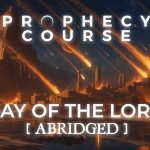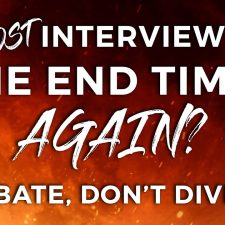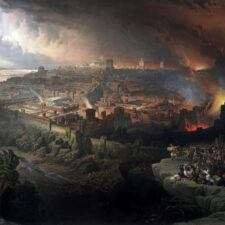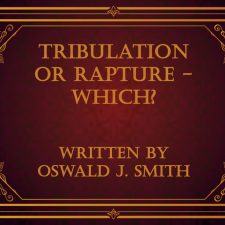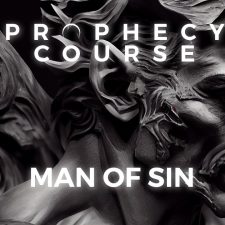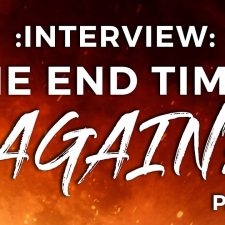(This is the final clip from the interview with Martyn Whittock, author of “End Times, Again?”. Here we discuss the shift between 1 Thessalonians 4 and 1 Thessalonians 5 and dialogue about our understanding of “Day of the Lord” language versus “Day of Christ”. Enjoy!)
[Matthew] One question before I let you go. So, you did mention 1 Thessalonians 4. I believe at this point—in my understanding of both 1 Thessalonians 4 and its marriage to 1 Thessalonians 5—I believe these passages are talking about two different events. There is the Day of the Lord—the national judgment that’s coming towards Israel at the time that this is being written. But then there is this “Day of Christ” that seems to be spoken to. I actually see those as two separate things. I believe that there is a Day of Christ, when the Lord comes back, that is His Second Coming. But here [in 1 Thessalonians 5], we get this Day of the Lord language mixed up with, “When we see the Son of Man coming on the clouds.”
[Martyn] My. That’s really interesting. I’ve never thought of that. I tended to think of it as being—but I’m open to be persuaded—I tended to see Day of the Lord as being a continuance of a Hebrewism in the Greek, you know, rooted in the Old Testament Day of the Lord, The Day. And I then read The Day of Christ as being, effectively, a Christianization of this, so that I would say the day of the Lord, but then I’d say, in the past, no one would’ve known what “Day of Christ” was, but now I know it’s Jesus.
So, I kind of interpreted that as being, effectively, synonyms for the same phenomenon.
[Matthew] The same event.
[Martyn] Yeah, one drawing upon, effectively, a Greek version of a Hebrewism. The Day of the Lord is obviously a very major thing in prophecy after prophecy. And that “The Day of Christ” or, you know, “The Day of Jesus,”—now, I know that that phrase doesn’t actually appear as such, but it’s effectively, “The Day of Jesus”—only fully makes sense, for me, when you understand that “The Day of the Lord” is inextricably connected with the revelation of Yahweh, God, in the person of His Son, Jesus. You see what I mean? So for me, that was something that could only make sense once people had a Christology, to be frank about it, and that’s when “The Day of the Lord” then became Christological when you could say, “Ah, that’s exactly the same as when Jesus will come back.” So I’d seen that as being synonyms, but I might be wrong. I mean, I haven’t studied enough.
[Matthew] Right, so, study out “Day of the Lord.” Actually, you know what? One of the, one of the ebooks that I just pulled down yesterday talked a little bit about this. But, yeah. ”Day of the Lord,” for me, is national judgment on Israel.
[Martyn] Right, that’s interesting.
[Matthew] And there’s plenty of cases in Old Testament for this, like Nahum, Obadiah, Isaiah.
[Martyn] Yeah, yeah, yeah. Yeah, it’s like a drumbeat, isn’t it? It’s like bam, bam, bam, the Lord, the Lord, the Day, the Day.
[Matthew] Yeah, but then we forget about it by the time we get to the Olivet Discourse, and we think it’s the literal stars and moon, you know, falling from the sky and all that. But that Thessalonians place, where 4 meets 5, read it again, because I think 1 Thessalonians 5 says, “But in that day.” I’ve got a Bible right here, I could pull it up, but I believe it says something along the lines of, “But in that day.” And therein is, these are two different events.
[Martyn] Right, that’s interesting.
[Matthew] We’re talking about the national judgment that it’s coming, that the early church knew about. Because our Lord had said, “It’s gonna happen in this generation,” they had that time clock going. And everywhere else in scripture, “this generation” means “this generation.” It doesn’t mean the generation to come 2000 years later, after Israel reforms in 1948.
[Martyn] And that’s a debate in itself, isn’t it, for “this generation.” Wow.
[Matthew] But every other place in scripture, “this generation” means “this generation,” the generations being addressed in that moment.
[Martyn] Yes, and that’s when you, of course, get into the whole preterist-futurist combination and we tend to fall into camps, don’t we? We are one or we are the other. But that’s when you think, yeah, the fall of Jerusalem A.D. 70 to 71. That clearly is part of what this is about, isn’t it? But on the other hand, is that also a foreshadow of much greater things at the end? Yeah, really interesting.
[Matthew] And that’s where we get into people trying to bring in that dual-fulfillment piece.
[Martyn] That’s right. That’s true too.
[Matthew] That we cut from this conversation, but that’s where that dual-fulfillment stuff comes in.
[Martyn] Yeah, fascinating.
[Matthew] All right, okay. Just wondered where you were at on that. You gave me a perspective that I didn’t have.
[Martyn] Yeah, and you challenged me to think more about that as well, myself.


